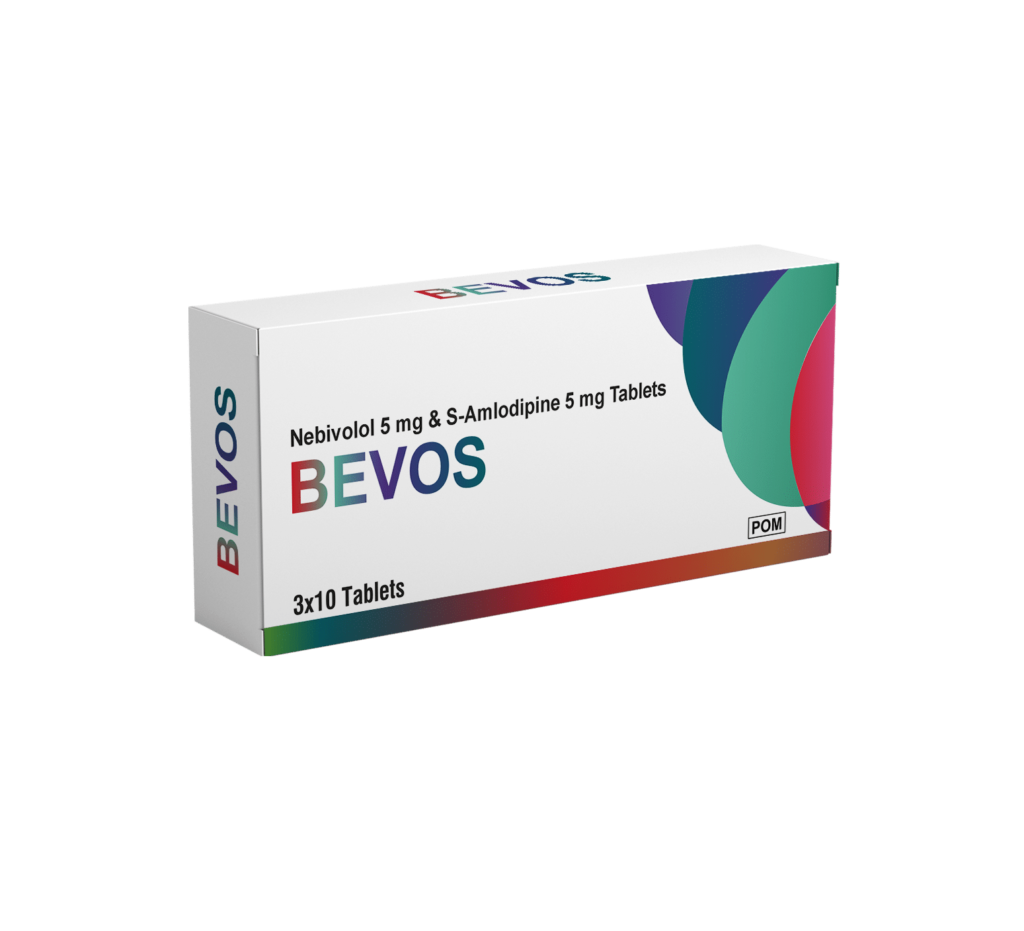
Hypertension and Chronic Stable Angina
Adults: The usual dosage is one Nebivolol & S-Amlodipine tablet 5mg/5mg, with or without food, once a day. The maximum daily dose should not exceed 5mg/10mg once daily.
Elderly: In patients over 65 years of age, the recommended starting dose is one 2.5mg/5mg tablet daily. The physician may increase the dose to 5mg/10mg if needed.
Patients with renal Impairment: No dosage adjustment is required in patients with mild to moderate renal impairment. In patients with severe renal impairment (ClCr < 30 mL/min) the recommended starting dose is 2.5mg/5mg once daily. If needed, upward titration should be performed cautiously.
Patients with hepatic disease: In patients with moderate hepatic impairment (Child-Pugh B), the recommended starting dose is 2.5mg/5mg once daily. If needed, the dosage should be upward titrated cautiously. Nebivolol and Amlodipine have not been studied in patients with severe hepatic impairment and therefore the fixed dose combination of Nebivolol plus Amlodipine is not recommended in patients with this condition.
Children and Adolescents: No studies have been conducted in children and adolescents. Therefore, use in children and adolescents is not recommended.
CYP2D6 Polymorphism: Dose adjustments are not necessary for patients who are CYP2D6 poor metabolizers. The clinical effect and safety profile observed in poor metabolizers were similar to those of extensive metabolizers.
Nebivolol:
Hypertension
The adverse reactions reported, which are in most of the cases of mild to moderate intensity, are listed below, classified by system organ class and ordered by frequency:
Common (≥ 1/100 to < 1/10), uncommon (≥ 1/1,000 to < 1/100), very rare (≤ 1/10,000) and not known adverse reactions occurring in patients treated with nebivolol are listed below.
Immune system disorders
Not known: angioneurotic oedema, hypersensitivity
Psychiatric disorders
Uncommon: nightmares; depression
Nervous system disorders
Common: headache, dizziness, paraesthesia; Very rare: syncope
Eye disorders
Uncommon: impaired vision
Cardiac disorders
Uncommon: bradycardia, heart failure, slowed AV conduction/AVblock
Vascular disorders
Uncommon: hypotension, (increase of) intermittent claudication
Respiratory, thoracic and mediastinal disorders
Common: dyspnoea; Uncommon: bronchospasm
Gastro-intestinal disorders
Common: constipation, nausea, diarrhoea; Uncommon: dyspepsia, flatulence, vomiting
Chronic heart failure
Data on adverse reactions in CHF patients are available from one placebo-controlled clinical trial involving 1067 patients taking nebivolol and 1061 patients taking placebo. In this study, a total of 449 nebivolol patients (42.1%) reported at least possibly causally related adverse reactions compared to 334 placebo patients (31.5%). The most commonly reported adverse reactions in nebivolol patients were bradycardia and dizziness, both occurring in approximately 11% of patients. The corresponding frequencies among placebo patients were approximately 2% and 7%, respectively.
Amlodipine:
The most commonly reported adverse reactions during treatment are somnolence, dizziness, headache, palpitations, flushing, abdominal pain, nausea, ankle swelling, oedema and fatigue.
The following adverse reactions have been observed and reported during treatment with amlodipine with the following frequencies: Very common (≥1/10); common (≥1/100 to <1/10); uncommon (≥1/1,000 to <1/100); rare (≥1/10,000 to <1/1,000); very rare (<1/10,000); not known (cannot be estimated from the available data).
Blood and lymphatic system Disorders
Very rare: Leukocytopenia, thrombocytopenia
Immune system disorders
Very rare: Allergic reactions
Metabolism and nutrition Disorders
Very rare: Hyperglycaemia
Psychiatric disorders
Uncommon: Depression, mood changes (including anxiety), insomnia; Rare: Confusion
Nervous system disorders
Common: Somnolence, dizziness, headache; Uncommon: Tremor, dysgeusia; Very rare: Hypertonia
Cardiac disorders
Common: Palpitations; Uncommon: Arrhythmia
Respiratory, thoracic and mediastinal disorders
Common: Dyspnoea; Uncommon: Cough, rhinitis
Gastro-intestinal disorders
Common: Abdominal pain, nausea, dyspepsia, altered bowel habits; Uncommon: Vomiting, dry mouth
Renal and urinary disorders
Uncommon: Micturition disorder, nocturia, increased urinary frequency
Reproductive system and breast disorders
Uncommon: Impotence, gynaecomastia
Nebivolol:
Anaesthesia: Continuation of beta-blockade reduces the risk of arrhythmias during induction and intubation. Exercise caution with certain anesthetics that cause myocardial depression.
Avoid using beta-adrenergic antagonists in patients with untreated congestive heart failure (CHF). Gradually discontinue beta-adrenergic antagonists in patients with ischemic heart disease. Avoid combining nebivolol with calcium channel antagonists like verapamil and diltiazem.
Metabolic/Endocrinological: does not affect glucose levels in diabetic patients.
Use beta-adrenergic antagonists with caution in patients with chronic obstructive pulmonary disorders, as they may aggravate airway constriction.
Amlodipine:
Researchers have not established the safety and efficacy of amlodipine in hypertensive crises.
Treat patients with heart failure with caution, as they may experience complications. Use calcium channel blockers, including amlodipine, cautiously in patients with congestive heart failure.
In patients with hepatic impairment, the prolonged half-life of amlodipine and higher AUC values occur, but clinicians have not established dosage recommendations.
Elderly patients: In the elderly increase of the dosage should take place with.
Patients with renal impairment can use amlodipine at normal doses, as changes in amlodipine plasma concentrations do not correlate with the degree of renal impairment.
Store below 30°C. Protect from light and moisture.
Keep out of reach of children.
3 x 10 Alu/Alu blister pack
BEVOS is available in an Alu/Alu blister of 10 tablets. Such 03 blisters in a unit carton with package insert.
Contact us directly to receive full information on the product, the formulation, the science behind it, stability data, and more. Our Business Development Manager is a click away.
Conical Pharmaceuticals is a professionally managed and dynamic organization with decades of experience in the pharmaceutical field. With a desire of providing opportunities for a better life, we work very hard to bring quality drugs to our customers. We have instilled a level of trust and confidence amongst our clients by supplying the best quality products.